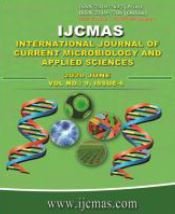


 National Academy of Agricultural Sciences (NAAS)
National Academy of Agricultural Sciences (NAAS)

|
PRINT ISSN : 2319-7692
Online ISSN : 2319-7706 Issues : 12 per year Publisher : Excellent Publishers Email : editorijcmas@gmail.com / submit@ijcmas.com Editor-in-chief: Dr.M.Prakash Index Copernicus ICV 2018: 95.39 NAAS RATING 2020: 5.38 |
Integrated fish farming is based on the concept that ‘there is no waste’, and waste is only a misplaced resource which can become a valuable material for another product. In integrated farming, the basic principles involve the utilization of the synergetic effects of inter-related farm activities and the conservation, including the full utilization of farm wastes. It is assumed that all the constituents of the system would benefit from such a combination. However, in most cases, the main beneficiary is the fishes which utilize the animal and agricultural wastes directly or indirectly as food. As integrated farming involves the recycling of wastes, it has been considered an economic and efficient means of environmental management. The economic benefit of integrated fish farming cannot be over-emphasized since the integration is varied and diversified in nature. It is one of the most viable, reliable and profitable of any farming enterprise. It contributes immensely to the economic empowerment of many families especially in the rural communities. It enables the farmer to be productive all the year round and fully maximize its production. Its contribution in the enhancement of food security and self-sufficiency is highlighted in this study. Integrated fish farming provides the farmer with a steady source of income all year round; this comes from various farm products. In duck-cum fish farming before the harvesting of the fish, which may take some months, the farmer can sell the eggs which will generate money for some time. Apart from this, money can also be generated from the vegetables or the crops that may be combined in the integrated fish farming. This study is based on primary data and conducted during the months of October 2016 to November 2016. To study the socio-economic status of the rural integrated duck cum farmers, a sample of 20 respondents was carved out randomly from the four villages in Purulia-I Block of district Purulia in West Bengal. The generated data were computed and analyzed through statistical tools and overall economic return in terms of productivity of the fishery and duckery practices, their gross return, net return and ultimate B:C ratio. Integrated duck-fish farming has become popular for household nutritional security and women empowerment in the remote villages of Purulia district. Additionally, the consumption of eggs/fish and meat adds to food quality and livelihood security of the resource-poor family. The study has concluded that the integrated duck-fish system could address issues of sustainability, women empowerment and livelihood security effectively.
 |
 |
 |
 |
 |